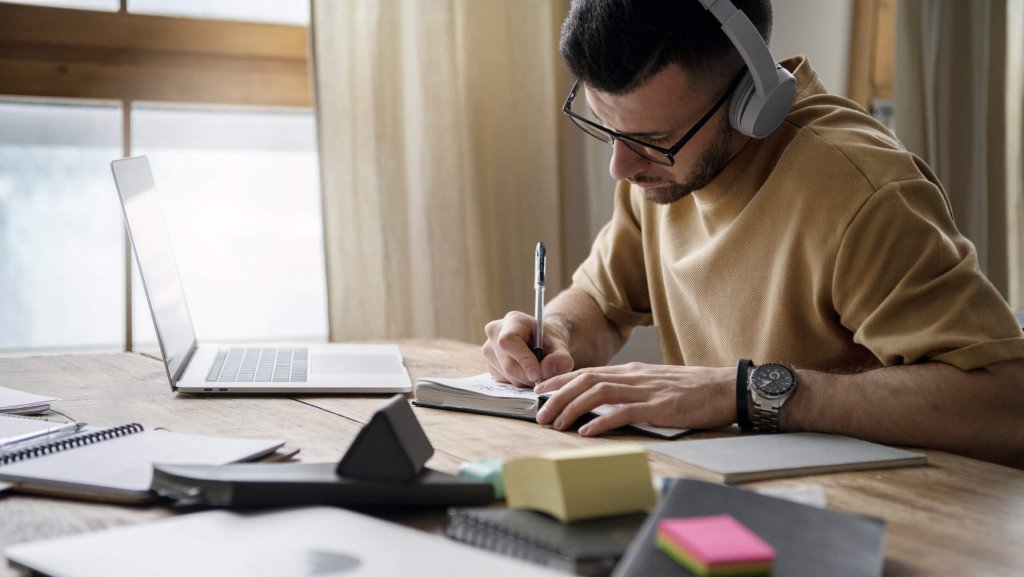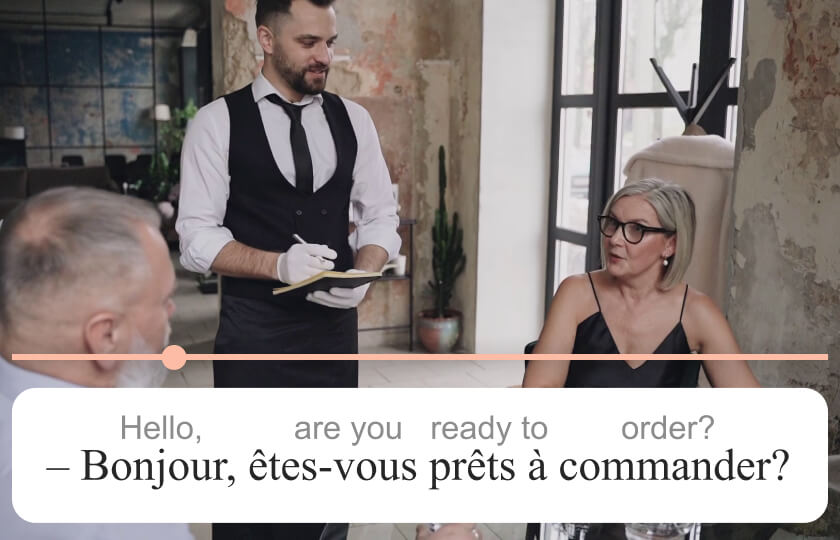
The amount of time it takes to learn French depends on your goals, learning methods, how diligent you are, and a few other factors. For some, learning French is about picking up enough to get by on a vacation in Paris. For others, it’s about reaching a fluency level where they can chat comfortably with native speakers or even work in French.
In this article, we’ll break down what goes into learning this beautiful language, giving you a realistic idea of how long it might take to become fluent. In addition, you’ll learn how to set achievable goals and enjoy the process.
What does fluency in French mean?
For most people, being fluent means being able to hold conversations with native speakers, chat about everyday topics, and not feel lost or stuck searching for words. It’s more than just memorizing vocabulary — fluency is about communicating naturally and understanding the flow of the language.
In language learning, we often use the Common European Framework of Reference (CEFR) to measure fluency. This system breaks down language levels from A1 (beginner) to C2 (mastery).
For conversational fluency, you’ll generally want to reach at least a B2 level. At this stage, you might not know every single word or phrase, but you can follow regular conversations, understand main points in complex topics, and share your thoughts confidently.
How long does it take to become fluent in French?
French is considered one of the easiest languages to learn for English speakers. The U.S. Foreign Service Institute (FSI) estimates that it takes about 600–750 hours of study to reach conversational fluency in French (or B2 level). This estimate assumes consistent effort and some immersion, like practicing with native speakers.
Here’s a breakdown of the hours needed for each CEFR level, which can help you set more specific goals along the way:
A1 (Beginner)
Reaching A1 takes around 70–100 hours. At this level, you’ll manage simple greetings, introduce yourself, and understand very basic phrases.
A2 (Elementary)
For A2, expect 150–200 hours. This level allows you to have short, everyday conversations and get by in common situations like ordering food or asking for directions.
B1 (Intermediate)
Achieving B1 takes about 300–400 hours. This level lets you comfortably talk about daily life, manage social interactions, and understand familiar topics.
B2 (Upper-Intermediate)
To reach B2, you’ll need 500–600 hours. This is often considered conversational fluency, where you can discuss complex topics, express your opinions, and communicate effectively in work or study settings.
C1–C2 (Advanced Mastery)
To get to C1–C2, plan for 700–1,200 hours. At these levels, you can engage in in-depth conversations, understand sophisticated texts, and operate in academic or professional contexts with ease.
Factors that impact your learning speed
Learning French is a unique journey for everyone, and the time it takes varies based on several factors. Here are some key aspects that influence how quickly you might progress.
Learning goals
Your goals make a big difference. If you’re learning French for travel, you may only need a basic level (A1 or A2), which you can reach relatively quickly. But if you need French for work or study, you’ll likely aim for B2 or higher, which takes a lot more time and practice.
Native language
English speakers have a slight advantage, as French shares a lot of vocabulary with English. Roughly 45% of English words come from French, which can make picking up vocabulary faster.
Previous language experience
If you already speak another language — especially one that shares grammar structures or vocabulary with French — this experience can speed up your learning. Knowing a Romance language like Spanish or Italian can be particularly helpful, as you’re likely familiar with similar sentence structures and word forms.
Age
Younger learners often pick up languages more quickly, especially in terms of pronunciation. But adults bring focus, motivation, and discipline to the table, which can make up for this difference. Adults who set clear goals and practice consistently can often progress faster than they expect.
Time commitment
The amount of time you spend studying French each day or week has a huge impact. Setting aside even 20 minutes a day helps, but consistent practice of 1–2 hours daily will bring you to fluency much faster. Immersing yourself in the language through media, conversations, or even short trips to French-speaking regions can also make a big difference.
Learning methods
Different learning methods work for different people. Using a mix of approaches — such as taking classes, consuming French content, practicing with native speakers, and using apps — tends to be more effective than relying on a single method.

Tips to learn French faster
If you’re eager to speed up your French learning, there are some tried-and-true strategies that can help you progress faster.
Focus on high-frequency words and phrases
Prioritize learning the most commonly used words and phrases first. Basic expressions and essential verbs and nouns will allow you to start having simple conversations quicker and boost your confidence.
Immerse yourself in the language
Surrounding yourself with French as much as possible can boost your learning speed. Listen to French podcasts, watch French YouTube or TV shows with subtitles, and follow French content on social media. Even small changes, like switching your phone’s language to French, can help.
Practice speaking regularly
One of the most efficient (and hardest) ways to improve is by practicing speaking, ideally with native speakers. Language exchange partners, tutors, or conversation groups are all great options. If native speakers aren’t accessible, try recording yourself or practicing with a friend. The more you speak, the more natural French will feel.
Engage with French-speaking communities
Connecting with other French learners or native speakers can make a big difference. Join online language groups, participate in forums, or attend language meetups if available in your area. Engaging socially lets you practice naturally and pick up on cultural nuances.
Mix up your learning methods
Variety keeps learning engaging and helps strengthen different language skills. Use a mix of methods like flashcards for vocabulary, grammar exercises, listening to podcasts, and reading simple articles. Apps, textbooks, and online resources can all complement each other and give you a well-rounded experience.
Stay consistent with daily practice
Studying a little each day is more effective than cramming. Aim for 15–30 minutes of focused practice daily, rather than a long session once a week. Building a daily habit, even if it’s brief, keeps the language fresh in your mind and helps reinforce what you’ve learned.
Be patient and enjoy the process
Learning a language takes time. Try not to get discouraged if progress feels slow. Remember, every bit of practice brings you closer to your goal. Learn to enjoy the process and celebrate small wins to stay motivated.
Setting realistic expectations and staying motivated
Learning French is a rewarding journey, but it’s important to set realistic expectations to avoid frustration along the way. Language learning isn’t instant — progress can sometimes feel slower than you’d like, especially as you move beyond the basics.
Expect some ups and downs
It’s natural to experience bursts of progress followed by plateaus where it feels like you’re not improving. Many learners hit an “intermediate plateau,” where the initial excitement fades and it becomes harder to notice improvement. This is normal, and sticking with it through these phases is key to eventual fluency.
Break your goals into small milestones
Instead of focusing solely on the big goal of fluency, set smaller, achievable milestones. For example, aim to hold a short conversation, understand a simple news article, or talk about your daily routine in French. Each milestone will give you a sense of accomplishment and keep motivation high.
Switch up your study routine
When motivation dips, try changing up your methods. If you’ve been studying grammar intensively, take a break with French music or a show. If speaking practice feels challenging, focus on reading or listening exercises for a while. Variety keeps things fresh and can renew your enthusiasm.
Celebrate your progress
It’s easy to focus on what you haven’t mastered, but recognizing how far you’ve come is just as important. Celebrate small wins, like understanding a phrase you previously struggled with or being able to introduce yourself comfortably in French.
Remind yourself why you’re learning
Whenever your motivation wanes, take a moment to reflect on your reasons for learning French. Whether it’s for travel, work, personal interest, or cultural connection, remembering your “why” can reignite your commitment. Visualizing the benefits and goals you’re working towards can make studying feel more meaningful.
Conclusion
So, how long does it take to learn French? The answer depends on your goals, study habits, and how deeply you immerse yourself in the language. For most English speakers, reaching conversational fluency takes about 600–750 hours of study. But everyone’s journey is unique, and there’s no “perfect” timeline.
The important thing is to keep a steady pace, set achievable goals, and stay motivated along the way. Learning French is as much about enjoying the process as it is about reaching a specific level. Every bit of practice, whether it’s speaking with a friend, watching a French movie, or practicing vocabulary, brings you closer to fluency.
Remember, language learning is a gradual process, and every small step counts. With dedication and a love for the language, you’ll find yourself communicating comfortably in French before you know it. Enjoy the journey — bonne chance!

